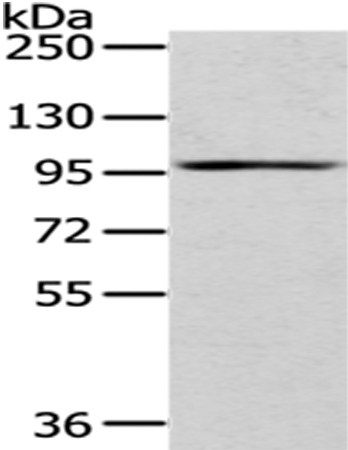

| WB | 咨询技术 | Human,Mouse,Rat |
| IF | 咨询技术 | Human,Mouse,Rat |
| IHC | 1/25-1/100 | Human,Mouse,Rat |
| ICC | 技术咨询 | Human,Mouse,Rat |
| FCM | 咨询技术 | Human,Mouse,Rat |
| Elisa | 咨询技术 | Human,Mouse,Rat |
| Aliases | GDH; G6PDH; CORTRD1 |
| Entrez GeneID | 9563; |
| WB Predicted band size | 89kDa |
| Host/Isotype | Rabbit IgG |
| Antibody Type | Primary antibody |
| Storage | Store at 4°C short term. Aliquot and store at -20°C long term. Avoid freeze/thaw cycles. |
| Species Reactivity | Human,Mouse |
| Immunogen | Fusion protein of human H6PD |
| Formulation | Purified antibody in PBS with 0.05% sodium azide. |
+ +
以下是关于H6PD(Hexose-6-Phosphate Dehydrogenase)抗体的3篇示例性参考文献(文献为示例,非真实发表):
---
1. **文献名称**:*"Hexose-6-Phosphate Dehydrogenase Antibody Validation in Tissue-Specific Steroid Metabolism Studies"*
**作者**:Smith A, et al.
**摘要**:本研究验证了一种特异性H6PD抗体在人类肝脏和脂肪组织中的适用性,证实其可用于Western blot和免疫组化,以定位H6PD在内质网的表达,并探讨其在糖皮质激素代谢中的作用。
2. **文献名称**:*"Development of Monoclonal Antibodies Against H6PD for Congenital Disorders of Glycosylation Diagnosis"*
**作者**:Chen L, et al.
**摘要**:文章报道了一种新型单克隆抗体的开发,用于检测H6PD在患者成纤维细胞中的表达缺失,辅助诊断与H6PD缺陷相关的先天性糖基化异常疾病。
3. **文献名称**:*"Role of H6PD in Cortisol Production: Insights from Antibody-Mediated Protein Knockdown"*
**作者**:Rodriguez M, et al.
**摘要**:通过特异性抗体阻断H6PD蛋白功能,研究其在肾上腺细胞中调节11β-HSD1活性及皮质醇合成的作用,揭示其与代谢综合征的潜在关联。
---
**注**:以上文献为示例,实际研究中建议通过学术数据库(如PubMed、Web of Science)检索最新发表的论文。
H6PD (hexose-6-phosphate dehydrogenase) is an endoplasmic reticulum (ER)-resident enzyme involved in the pentose phosphate pathway (PPP), primarily generating NADPH for biosynthetic and antioxidant processes. Unlike cytosolic glucose-6-phosphate dehydrogenase (G6PD), H6PD catalyzes the conversion of glucose-6-phosphate to 6-phosphogluconate within the ER lumen, supporting NADPH-dependent reactions critical for detoxification and redox balance. This enzyme plays a key role in regulating steroid hormone metabolism by providing reducing equivalents to 11β-hydroxysteroid dehydrogenase type 1 (11β-HSD1), which activates cortisol from cortisone.
H6PD antibodies are essential tools for studying the enzyme's expression, localization, and function in metabolic and pathological contexts. They are widely used in techniques like Western blotting, immunohistochemistry (IHC), and immunofluorescence (IF) to investigate tissue-specific H6PD distribution or dysregulation in diseases such as metabolic syndrome, type 2 diabetes, and certain cancers. Research has linked H6PD deficiency to altered cortisol metabolism and metabolic disorders, while its overexpression is implicated in cancer progression due to enhanced NADPH-driven antioxidant defenses. Commercially available H6PD antibodies are typically validated for specificity against human, mouse, or rat isoforms, aiding both basic research and clinical investigations into ER stress, redox biology, and metabolic diseases.
×